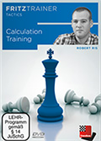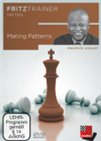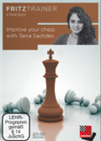Good timing
The new co-leaders in Isle of Man won their games when it mattered the most. They know now that a draw will give them big chances of getting to a playoff, while a win will secure first place. Naiditsch's decision to take a bye in round six might be a big factor in such a gruelling event, as he will probably be fresher than his Polish rival in the final showdown — the Azeri will also play with the white pieces.
The same can be said of Gawain Jones, who obtained two remarkable results in rounds seven and eight — he incredibly rescued a draw against Richard Rapport and then went on to beat rating favourite Levon Aronian. Jones has alternated perfectly a draw and a win so far in the tournament, so this will be a good time to break the cycle (positively, not with a loss) if he wants to have a shot at first place. The Englishman will have Black against Jeffery Xiong.
In round eight, Wang Hao collected his fourth straight draw — after four wins in a row —, a good result if we take into account the fact that he had the black pieces against Maxime Vachier-Lagrave. The Chinese player used the Petroff to do so, and kept his opponent's initiative at bay with accurate defensive manoeuvres.

Vachier-Lagrave tried hard but could not break Wang Hao's defences | Photo: John Saunders
On board two, Arkadij Naiditsch had the tough task of facing Hikaru Nakamura, a well-known specialist in open tournaments — he won the Gibraltar Masters three years in a row, for example. It is no surprise that their game was particularly exciting, as neither of them shies away from complications, even when the stakes are high. A complex opening left White a pawn for the good and both players low on time — when the time control was dangerously approaching, Nakamura took a drastic decision:
Hikaru went for the throat with 26...Bxh3 and Arkadij answered with the precise 27.c6. If you say a you must say b, so the American kept opening lines against the white king with 27...Qc8 28.f3 Bxg2. The computer assessed the position as clearly better for White, but in the time scramble Black missed a chance to get ahead:
In less than two minutes, Nakamura played 35...Re5 — he probably did not have enough time to calculate all the variations that would have arisen after the strong 35...Nf4. He probably feared White's mating threats and the dangerous passed d-pawn. However, the American would have gotten good chances after 36.Rd7+ Qxd7 37.cxd7 Nxe2+ 38.Kf2 Rd5:
 This DVD emphasizes the importance of training your calculation skills. Dutch IM Robert Ris made a selection of training material which he uses in lessons with students ranging from 1400 to 2400.
This DVD emphasizes the importance of training your calculation skills. Dutch IM Robert Ris made a selection of training material which he uses in lessons with students ranging from 1400 to 2400.
Black will take the d-pawn and have two pawns and a rook against White's two pieces, with good chances in the endgame. Nevertheless, the game went in another direction — White slowly eliminated his rival's threats and started using his extra piece in the attack. In the final position, White has complete domination of the board:

Naiditsch and Nakamura played a highly tense game | Photo: John Saunders
Radek Wojtaszek's win lasted only one move less than Naiditsch's, but had more to do with what happened before move 20. The Polish grandmaster was very well prepared in the opening — he gave up a pawn for the initiative and took less than thirty seconds per move until move 15. Adams was clearly out of book and thought for over eleven minutes before blundering in a sharp position:
 The Catalan is one of the most solid openings for White. It forms part of the large and strong fianchetto family in which White builds his strategy mainly around the bishop on g2. Grandmaster Victor Bologan covers all of Black’s replies to the Catalan, some of which can even transpose to other openings such as the Tarrasch System and the Queen’s Indian. Suffice it to say that the Catalan rules!
The Catalan is one of the most solid openings for White. It forms part of the large and strong fianchetto family in which White builds his strategy mainly around the bishop on g2. Grandmaster Victor Bologan covers all of Black’s replies to the Catalan, some of which can even transpose to other openings such as the Tarrasch System and the Queen’s Indian. Suffice it to say that the Catalan rules!
The Englishman went for 15...Na5?, a move that surprised Wojtaszek, who was probably waiting for some kind of queen manoeuvre — he knew this was a mistake. In turn, he took thirteen minutes to find the correct 16.Qb4. The game continued 16...Qxb4 17.axb4 e5:
Wojtaszek decided it was time to take advantage of the opened long diagonal (the knight jump two moves earlier opened it) and gained the exchange with 18.Bxa8. Black had the pair of bishops, but Wojtaszek's technique kept his advantage alive until forcing Adam's resignation on move 45.

Adams blundered in the opening | Photo: John Saunders
Late-tourney upsets
Only in a tournament with such embarrassment of riches we can see an upset on board five in the penultimate round. It is true that Gawain Jones is a two-time British champion and a recognised grandmaster in his own right, but it is also true that to face Levon Aronian is one of the toughest tasks in the business — in fact, Gawain is 113 points lower rated than Levon.
In the game, Aronian opened the f-file for his rook and gave up the bishop pair to get the initiative on the kingside, and for some time that did not seem to be such a bad decision. On move 21, the Armenian gave up the exchange to maintain the pressure:
 Dynamic play is what makes your chess effective and most importantly fun! Timur Gareyev shows severeal examples which aspects are important to remember when seizing for the initiative!
Dynamic play is what makes your chess effective and most importantly fun! Timur Gareyev shows severeal examples which aspects are important to remember when seizing for the initiative!
Levon played 21...Qg5 and Gawain took the material with 22.Bxf8. Black's attack never quite gained momentum, and after the queens were exchanged White's task to get the point was mostly technical. Aronian put all his hopes on his passed d-pawn, but nothing came out of that and Jones finished the job with an exchange sacrifice:
Black resigned after 51.Rxc5 — the f2-bishop will fall next. Certainly a memorable win for Jones.

Gawain Jones | Photo: John Saunders
Way down on board 24, another upset took place: the underperforming Boris Gelfand fell victim to 13-year-old Vincent Keymer. The former World Championship challenger lost the thread shortly after the time control and his young opponent did not miss the chance to collect the win:
 On this DVD, Grandmaster and worldrenowned commentator Maurice Ashley reviews some of the most interesting patterns with examples meant to educate and entertain.
On this DVD, Grandmaster and worldrenowned commentator Maurice Ashley reviews some of the most interesting patterns with examples meant to educate and entertain.
Gelfand has a queen for a rook and a bishop, but White's pieces have an open road to attack the king. Keymer played 44.Rh8, aware of the continuation that would eventually give him the victory — 44...fxe4 45.f4 Nf8:
The pawn check with 46.g5+ creates the decisive mating net. There followed 46...Kh5 47.Nf6+ Kh4 48.Nxh7 e3+ and Black resigned after 49.Bxe3:
 On this DVD, well-known Indian WGM Tania Sachdev shows you how to evaluate certain positions and then find the right concepts and plans on the basis of her own games.
On this DVD, well-known Indian WGM Tania Sachdev shows you how to evaluate certain positions and then find the right concepts and plans on the basis of her own games.

Gelfand faltered against the promising German youngster | Photo: John Saunders
So, only six players can now win the Isle of Man Tournament. Naiditsch will play Wojtaszek in the main game of last round, while Xiong versus Jones will be the only direct encounter between players from the chasing pack. The other two chasers will take on players that have no chance of winning…but that does not mean their pairings are any easier — MVL will play Grischuk and Wang Hao will face Anand!
Round 9 pairings (top 20 boards)
Games from Round 8
Links
























